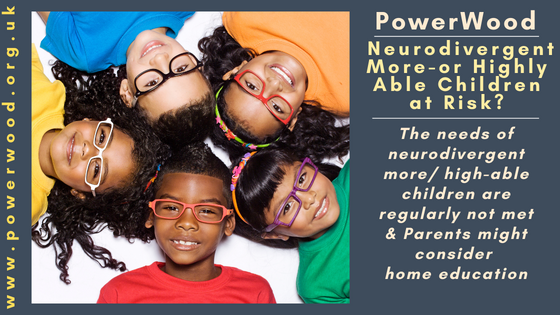
Unfortunately, the needs of neurodivergent more/ high-able children are regularly not met because of, e.g. ignorance of the needs and issues around high-ability in combination with neurodivergent characteristics, lack of funding or biased thinking that helping high-able children is elitist because they are advantaged already, not realising that problems they face make them a special needs group. If the intellectual, social and emotional needs of gifted children are met they are not at extra risk (Webb et al., 2005).
Consequences

By letting neurodivergent high-able children down negative consequences might be created.
- Neurodivergent high-able pupils are at risk if their intellectual, social and emotional needs are not met. They need special programmes. If not, they are at risk of underachieving and developing social, emotional or behavioural problems (Webb et al. 2005). At schools with a specific programme for the highly able, normally the emphasis is on the intellectual needs of the high-able, leaving programmes to meet the social and emotional needs to be developed.
- Social and emotional adjustment is influenced greatly if their educational needs are met (National Association for gifted children, 2002; Neihart, 1999).
- It is not known to many that the primary characteristics of the highly able are intensity, sensitivity and overexcitability (Lind, 2001). Because the behaviour of highly able children can be significantly different from the norm, highly able pupils are at risk of misdiagnosis and dual diagnosis (Webb et al., 2005).
- 90% of diagnosed highly able children in the USA learn to play the system and thereby lose their autonomy and creativity. They do not possess the necessary skills, concepts, and attitudes necessary for lifelong learning. Gifted young adults who may underachieve in college and later adulthood come from this group (Betts, 1988). This could be a consequence of the fact that most programmes are meeting only the intellectual needs of the gifted.
Facts
- The risk of learning disorders increases as a function of IQ (Silverman, 2005), explaining the more common occurrence of twice-exceptionals or DME (Dual, Multiple Exceptional), neurodiverse more-able children with learning disabilities, among the more and highly able.
- Some disorders, like Existential Depression and Anorexia Nervosa, are more likely to occur among high-able children. (Neihart, Piirto, Webb, quoted in Webb, 2005). Webb (2005) questions how many of these disorders are the results of the interaction between temperament and environment and concludes that changing the environment can effectively treat many conditions.
Schools, teachers, professionals and parents should get the chance to be informed and understand how high-able children experience the world, so they are able to support them effectively and meet the intellectual, social and emotional needs of those children.
Support in making an Informed Decision about Home Education
Many parents consider home education, especially since the Covid-19 lockdown, more information about home education can be found here.
If parents want to be supported in making an informed decision about if home education would be a viable option for them and how to start home education or on another issue, they are welcome to contact Simone de Hoogh ‘ECHA Specialist in Gifted Education’, Qualified Coach and Parenting Consultant and experienced home educator herself for a Free Introductory Talk by Zoom to explore if she could be of support for you.
Emotion Regulation
Multilevel Emotion Regulation Theory (MERT) is a holistic theory developed by Simone de Hoogh. The theory explains how neurodiverse (young) individuals and parents of neurodiverse children can develop emotional regulation skills and direct their energy towards self-chosen goals, and contribute to society.
Book a FREE Introductory Talk with a Professional*
You can read more about PowerWood’s Consultancy Sessions, the Benefits of a Free Introductory Talk and PowerWood’s Consultancy Services Tiered Fee Structure.
